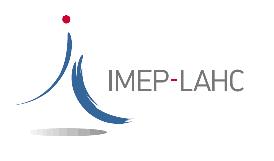Simulation, development and characterization of piezoelectric nanowires
Published : 12 October 2021
Period : first semester 2022
Simulation, development and characterization of piezoelectric nanowires
IMEP-LaHC / LMGP/ MINATEC / Grenoble – France
Keywords: :
Nanotechnologies, Nanowires, Piezoelectricity, Semiconductor physics, Characterization, FEM simulation.
Training:
Very recently, the scientific community gets interested in nanowire (NW) based devices, thanks to their unique electrical and mechanical properties due to their (1D) structure. These properties could be exploited advantageously for several kinds of applications, such as sensors, actuators and energy harvesting devices [1-4]. One aspect that has been very little explored is the effect of electromechanical non-linearities which can greatly affect the energy conversion efficiency.
The training will mostly concentrate on the mechanical to electrical transduction using ZnO NWs.
 The objective of this training is to grow ZNO NWs with controlled dimensions and doping (Fig. 1a), then
The objective of this training is to grow ZNO NWs with controlled dimensions and doping (Fig. 1a), then
integrate them in different test structures allowing their mechanical, electrical or electromechanical
characterization (Fig. 1b) The NWs will be characterized using SEM, XRD between others to control their structural quality, then they will be characterized with advanced AFM modes (Atomic Force Microscopy) available in the laboratory [5, 6] or other with other techniques by partners at national level (i.e. Synchrotron).
The training has four different and correlated goals:
- Participate to the growth of NWs by hydrothermal synthesis and the control of their doping.
- Participate to the fabrication of NWs into different test structures.
- Participate to the electrical and/or electromechanical characterization and/or the measurements analysis, for example using AFM.
- Eventually, the student could participate to the modeling of the test structures integrating NWs using the Finite Element Method (FEM) approach.
The achievement of these goals will allows us to better understand the underlying physics and linear /nonlinear phenomena involved and to develop optimization guidelines for different applications, for example energy harvesting or sensing.
The student will benefit from an established collaboration framework between LMGP and IMEP-LaHC laboratories (project ANR LATINO 2022-2025 including also IM2NP in Marseille and SOLEIL in Saclay).
Références :
[1] S. Lee, R. Hinchet, Y. Lee, Y. Yang, Z.-H. Lin, G. Ardila, L. Montes, M. Mouis, Z. L. Wang, “Ultrathin Nanogenerators as Selfpowered/Active Skin Sensors for Tracking Eye Ball Motion”, Adv. Funct. Mater., 24 (2014) p. 1163-1168.
[2] R. Tao, M. Mouis, G. Ardila, “Unveiling the Influence of Surface Fermi Level Pinning on the Piezoelectric Response of Semiconducting Nanowires”, Adv. Electron. Mater., 4(1), (2018) p. 1700299.
[3] R. Tao, G. Ardila L. Montes and M. Mouis, “Modeling of semiconducting piezoelectric nanowires for energy harvesting and sensing” Nano energy, 14 (2015) p.62-76.
[4] R. Tao, M. Parmar, G. Ardila, P. Oliveira, D. Marques, L. Montès, M. Mouis, “Performance of ZnO based piezo-generators under controlled compression”, Semiconductor Science and Technology, 32(6) (2017) p. 064003.
[5] A. J. Lopez Garcia, G. Sico, M. Montanino, V. Defoor, M. Pusty, X. Mescot, F. Loffredo, F. Villani, G. Nenna and G. Ardila, “Low-Temperature Growth of ZnO Nanowires from Gravure-Printed ZnO Nanoparticle Seed Layers for Flexible Piezoelectric Devices”. Nanomaterials, vol. 11(6), p.1430 2021.
[6] Y.S. Zhou, R. Hinchet, Y. Yang, G. Ardila, R. Songmuang, F. Zhang, Y. Zhang, W. Han, K. Pradel, et al., “Nano-newton transverse force sensor using a vertical GaN nanowire based on the piezotronic effect”, Adv. Mater., 25, p. 883-888 2013.
Competences :
Applicants must have a Master 1 degree within 3 years of the application deadline in a related field of materials science, microelectronic technologies and semiconductor physics. Modeling skills are welcome.
Please address these skills directly in your application.
Cross-functional skills such as teamwork, open-mindedness and fluency in spoken and written English are essential.
More info :
Duration: 4 to 6 months (first semester 2022)
Level: Master 2 / Engineering School
Location: IMEP-LaHC /LMGP/ Minatec / Grenoble, France
Advisors: Gustavo ARDILA (ardilarg@minatec.grenoble-inp.fr)
Céline TERNON (celine.ternon@grenoble-inp.fr)
Application Instructions :
A complete application consists of:
- CV : Academic and professional background, detailing relevant experience, particularly research.
Include the name and contact information of at least one academic or professional reference who can attest to your professional skills and ability to work in a team. - Relevance of the application: short motivation and emphasis on the fit between the internship topic and his/her own skills. The applicant must include a clear description of how his/her academic background and expertise is applicable and can add value to the project described above.
Our team welcomes candidates with diverse backgrounds and experiences. We view equal gender representation and diversity as a strength and asset to our team.
A continuation in a PhD thesis is possible and we are looking for candidates with the intention to continue in thesis.
About the laboratories:
IMEP-LAHC / MINATEC / Grenoble
L’IMEP-LAHC is located in the Innovation Center Minatec in Grenoble. The main research areas concern Microelectronic devices (CMOS, SOI, …), Nanotechnologies, Photonic and RF devices. It works in close partnership with several industrial groups such as ST-Microelectronics, IBM, … and platforms such as LETI, LITEN, IMEC, Tyndall. The training will be within the group working on MicroNanoElectronic Devices / Nanostructures & Nanosystems. The trainee will have access to several technological (clean room) and characterization platforms.
LMGP / MINATEC / Grenoble
Le LMGP is located in the Innovation Center Minatec in Grenoble and cover activities in (nano)-materials science including their synthesis by chemical deposition and their structural characterization. The training will be within the team FunSurf.
Contacts:
Gustavo ARDILA ardilarg@minatec.grenoble-inp.fr 04.56.52.95.32
Céline TERNON celine.ternon@grenoble-inp.fr 04.56.52.93.66



 Contact us
Contact us How to find us
How to find us











